
The Voices We Need to Hear: Lessons from the 2021 Her Power Summit
The Her Power summit, which took place over two mornings on October 26 and 27, 2021, brought together leading women from the public and private sectors for discussions on a wide range of topics, including sustainability, climate change, health, and education. Throughout these discussions, participants came back to the key idea that the COVID-19 pandemic has exposed existing societal inequalities—particularly gender inequality—and should be a catalyst for immediate, ambitious action to eliminate those inequalities and more effectively support women. In the face of ongoing challenges, and almost two years into the pandemic, the event was optimistic, expressing confidence in the potential for women to take the lead and create the change necessary for global growth, safety, and prosperity.
Watch highlights from the 2021 Her Power Summit here (full recording available here), and read on for insights from the event:
Key Takeaways
Urgent action is necessary: In conversations on issues ranging from the post-pandemic economic recovery to climate change to female labor force participation, participants emphasized that change and action cannot wait. While all who were involved expressed optimism that discussions around these issues have become common, including among world leaders and policymakers, there was a consensus among participants that now action must follow words, not only to achieve global goals such as the Sustainable Development Goals and the Paris Climate Accords, but also to prevent the impacts of the COVID-19 pandemic from becoming entrenched.
Helping women helps everyone: Throughout the summit, public- and private-sector leaders drew attention to the ways in which policies addressing what may be seen as “women’s issues”—such as promoting girls’ education, improving qualities of childcare, and providing targeted loans and financing to women—in fact have positive impacts on the whole of society. As such, they encouraged policymakers, thought leaders, and business owners to invest in women in order to invest in the prosperity of society as a whole.
Women are leading on gender and climate issues: While women remain under-represented among political leaders, speakers highlighted the outsized impact that those female leaders are having on progress toward gender equality, environmental preservation, and pandemic response. Female business leaders and philanthropists additionally provided a model for how women outside of politics are implementing practical solutions to many of the challenges outlined throughout the conference.
Day One
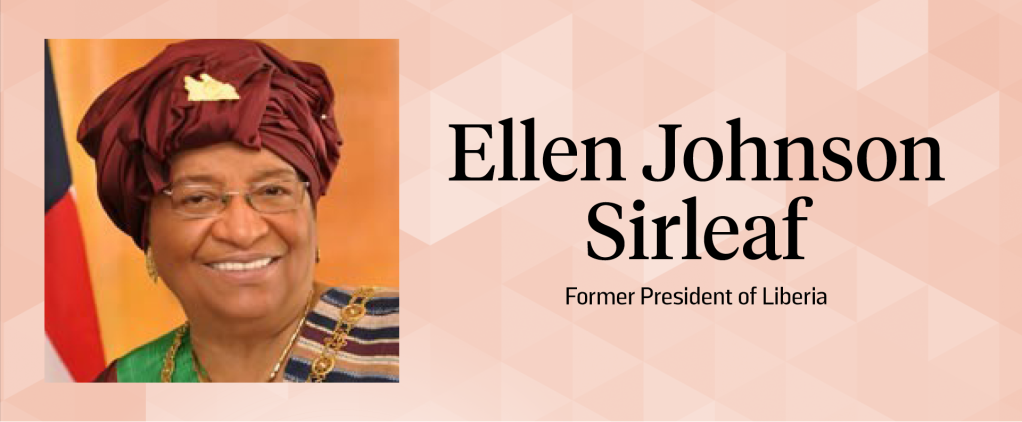
How Women’s Leadership Can Catalyze a More Sustainable Future
Former President of Liberia, Ellen Johnson Sirleaf, began her conversation with moderator and Foreign Policy Editor-in-Chief Ravi Agrawal by emphasizing the necessity for global collective action to combat COVID-19, particularly regarding vaccinations, noting that “no one is safe until everyone is safe, [but] Africa is behind.” For that reason, she advocated for companies to share their patents in order for African nations—of which only 15 have vaccinated more than 10 percent of their populations, according to the WHO—to begin manufacturing and distributing vaccines immediately, without waiting for donations from richer countries. As president of Liberia during much of the Ebola crisis, Sirleaf noted that many of the lessons of that crisis can be applied to the COVID-19 pandemic: leaders need to communicate reliably and in a timely fashion with their populations, engage with community and religious leaders at the grassroots level, and take responsibility for ensuring outcomes and bringing communities together around a common cause.
Sirleaf also spoke about her work with the newly established Ellen Johnson Sirleaf Presidential Center for Women and Development, which has the goal of promoting women to leadership offices in politics and throughout the private sector, praising the leadership of female politicians in Germany and New Zealand throughout the pandemic. Through mentorship and skills training, the center prepares women for public office and leadership, while additionally working to change male attitudes toward women. Sirleaf ended her session by expressing hope that in the future she will no longer be seen as a rarity or an exception, as more women are democratically elected to political leadership.
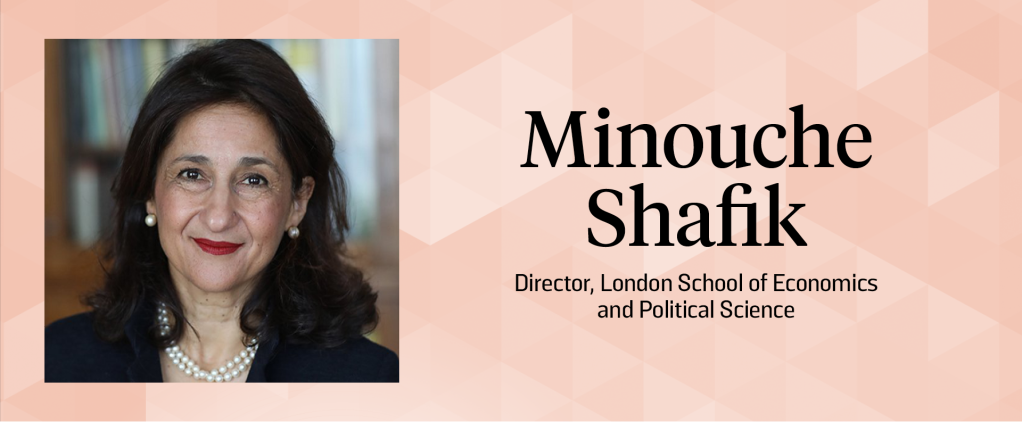
Fireside Chat with Minouche Shafik
Minouche Shafik, director of the London School of Economics and Political Science, joined Her Power for a brief but in-depth discussion of the impact of women’s leadership and women’s rights in policymaking. In Shafik’s view, the rise in populism seen in recent years can be attributed to two major causes: the growing role of technology and automation, and the changing role of women in society. She observed that, as women’s rights proliferate around the world, societies are no longer able to rely on women as unpaid caregivers for the very young and very old, as they choose instead to enter the formal or informal workplace. This shift is putting pressure on established social structures and systems built around the inherent expectation that women will provide free domestic labor, exposing these systems as flawed and unfit for purpose. Despite the clear economic reasons for encouraging more women to enter the workplace—the IMF estimates that women’s labor can increase national GDP by around 35 percent—few governments are choosing to provide high-quality, low-cost or free childcare and elder care that would help women remain and thrive in the workplace, an oversight that Shafik believes will cost countries more in the long run in lost productivity and pensions. She noted that the key to the passage of more progressive laws, including around social protections and caregiving, is electing more women to political power, highlighting the example of Rwanda, where nearly two-thirds of parliamentary seats and over half of cabinet positions are held by women. Shafik stated that crafting policies supportive of women requires the presence of female policymakers, otherwise “people don’t think about the impact of policies on men and women and how they might differ. There’s been a huge push to disaggregate data by gender and [to be] able to assess the impact of how [a policy] might affect men and women differently, but it doesn’t happen enough.”

Panel 1: Valuing Caregiving to Drive Growth
Moderated by Reena Ninan, the founder of Good Trouble Productions and host of FP Studios’ The Hidden Economics of Remarkable Women (HERO) podcast, this discussion highlighted the economic arguments for high-quality, well-paid caregiving, taking India as a key example. Sabrina Natasha Habib, CEO and co-founder of Kidogo Early Years, a social enterprise improving access to affordable early-childhood care in East Africa, opened the session by highlighting the economic argument for valuing caregiving, noting that high-quality childcare not only enables women to enter the workforce and contribute to national output and GDP, but is also an investment in the education and development of future generations. To Habib, childcare is not “just” a women’s issue, but one that affects everyone, as everyone in society will benefit if tomorrow’s leaders and workers are taught values such as respect and empathy from a young age. She noted that “when women are able to work, because they’ve got access to quality, affordable childcare, companies grow. There’s better retention rates, less absenteeism, and you’re building a pipeline of human capital for the next generation.”
Mirai Chatterjee, chair of the board of WIEGO, a global network working to improve the conditions of women in the informal economy, argued that children have suffered the most in society during the pandemic, as many have been unable to attend school at all, and are being socially isolated during critical years for early childhood development. Chatterjee also noted that high-quality childcare is key to women’s independence—an estimated 85 percent of women worldwide who have not returned to work during the pandemic have been prevented from doing so due to a lack of childcare options. In India, where Chatterjee is based and works, studies have found that high-quality, full-day childcare can increase women’s incomes by at least 50 percent, in some cases even doubling it, creating clear and positive impacts for individuals, communities, and the nation. Chatterjee also advocated for the creation of strong labor force protections, particularly for the informal economy, where 94 percent of Indian female workers are employed, calling for the creation of strong unions and the implementation of government-led social protection programs, including free or low-cost childcare and health care.
In closing, Habib advocated for financial mobilization around the issue of childcare, noting that investment and funding are needed to shift from conversation into action, and suggesting that private- and public-sector investors could make universal childcare budgeting a condition of their loans and investments going forward. For Chatterjee, convincing governments to invest in women, and in childcare particularly, will require collective action both nationally and internationally, to demonstrate the widespread desire for change. For more on the global care crisis and related solutions, click here.

Q&A with Ana Brnabic
Serbian Prime Minister Ana Brnabic joined FP’s National Security and Intelligence reporter, Amy Mackinnon, for a wide-ranging discussion about Serbia’s current situation regarding the pandemic, women in government, and her hopes regarding European Union accession. Brnabic highlighted Serbia’s e-government initiative, which was launched several years prior to the outbreak of COVID-19 but has become a key asset in the country’s pandemic response as it has significantly reduced the amount of in-person interaction required for citizens to access basic services, including school and kindergarten registration. Brnabic highlighted how Serbia was also ahead of much of the world regarding digital classrooms, which were introduced in the country in 2018 alongside digital textbooks, both of which assisted in the shift to online education during the pandemic. Brnabic also noted the success of the country’s vaccination campaign, which has been entirely tracked and pursued online. After citizens apply for a vaccine appointment online, the government’s computer system tracks whether they have completed the visit, and it sends automated reminders for follow-up vaccine appointments, leading to higher rates of appointment attendance.
Beyond the pandemic, Serbia’s digitization strategy is a key pillar in the country’s attempt to reverse the severe brain drain it has experienced in recent years. The focus on technology research and development has, in the prime minister’s view, caused young, university-educated Serbians to remain in the country following graduation.
Brnabic also discussed women’s rights in Serbia, noting that despite progress, there is much still to be done. While the country has a 40 percent minimum quota for women in parliament, and mandates a certain level of female representation on all electoral lists, at the grassroots level there is still a significant issue of intimate partner violence that affects women and has been exacerbated by the strain of the pandemic. The government is, however, working to tackle these concerns; in 2021, Parliament passed a wide-ranging gender equality law that includes the provision of domestic violence services, and a ministerial group has been formed to address intimate partner violence and the effects of the pandemic.
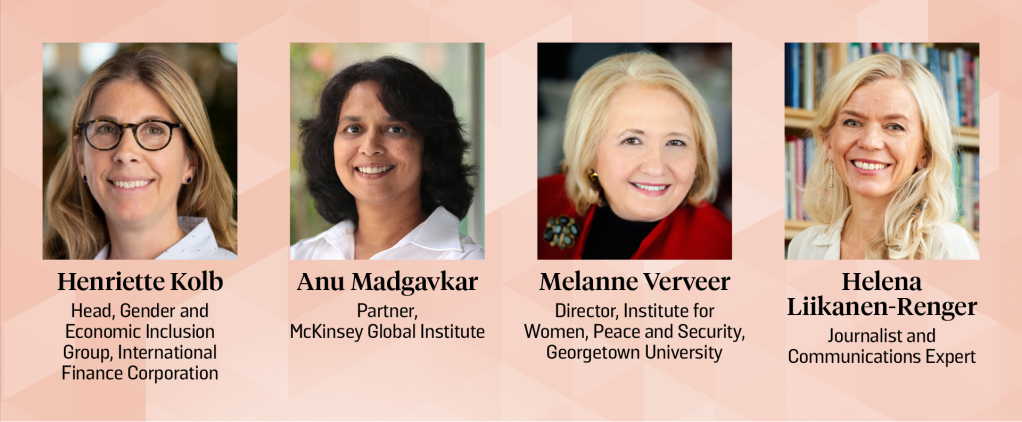
Panel 2: Strategies for Inclusive Global Development: Can the Nordic Model Offer a Blueprint?
Following a video presentation that featured ambassadors from the Nordic model discussing the strengths of their public policy strategies for achieving gender equality, moderator Helena Liikanen-Renger brought together Anu Madgavkar, partner at McKinsey Global Institute, Melanne Verveer, director of the Institute for Women, Peace and Security at Georgetown University, and Henriette Kolb, head of the Gender and Economic Inclusion Group at the International Finance Corporation, to discuss strategies for development that are inclusive of women and girls and encourage their equal participation in all aspects of society. All three women emphasized the intersectional nature of development policy, in which challenges and solutions are overlapping, requiring interconnected responses; for example, they noted that improving girls’ school attendance in developing countries not only requires training teachers and shifting attitudes toward girls’ education, but also ensuring that schools are equipped with high-quality sanitation facilities and clean drinking water.
Anu Madgavkar highlighted a common theme of the conference, noting that the COVID-19 pandemic has exposed the deep-rooted structural inequalities that persist in society, particularly an ongoing reliance on women’s low- or unpaid work to support the current economic system. Madgavkar argued that women have been disproportionately hit by the pandemic but that they have also been major beneficiaries of innovative and progressive government responses to the pandemic’s impact, particularly through the implementation of relief programs. Looking ahead, she advocated for the importance of building strong digital infrastructure, including in low- and middle-income countries, and particularly for an increase in digital financial inclusion. Developing digital infrastructure, she said, would have two major implications for women around the world: increasing the ease of remote and hybrid work styles that are more compatible with caregiving responsibilities, and accelerating automation that will present opportunities for women to be trained in new, lucrative skills.
Melanne Verveer agreed that the COVID-19 pandemic has eroded much of the progress that has been made in women’s rights and empowerment in recent years, presenting a challenge regarding ways to reverse those losses quickly. In particular, Verveer highlighted the loss of professional childcare infrastructure, a significant drop in school attendance by girls, and an alarming increase in violence against women. These losses for women will quickly become losses for society as a whole; she noted that “when the status of women is eroded or not what it should be, democracy certainly suffers,” but that countries that prioritize women’s rights tend to be more prosperous, more peaceful, and less authoritarian. She argued that countries around the world can learn from Nordic countries, which are modeling widespread female political and private-sector leadership and prioritizing social protections for women.
Closing the discussion, Henriette Kolb emphasized the importance of directing capital flows toward women. Prior to the pandemic, only 7 percent of financing went to women, and women were three times more likely to be turned down for a loan than their male peers. For this reason, Kolb argued that the investment industry must focus on women as a key constituency, not only by working to put more women in positions to make investment decisions, but also by tailoring products and financial institutions toward women’s wants and needs. Finally, Kolb repeated a call for the collection of more and higher-quality data across all levels of the supply chain, and for data to be disaggregated by gender, so that the investment community can gain a clearer understanding of women’s business needs.
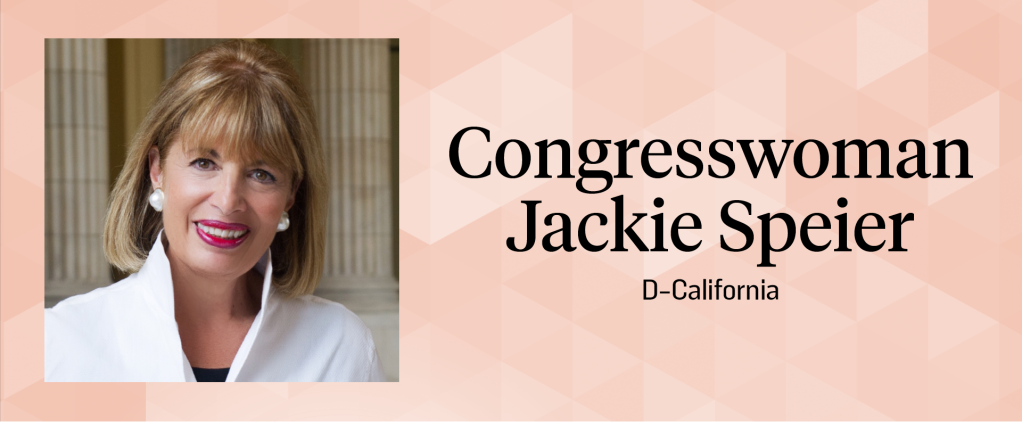
Fireside Chat: A View from Congress, with Congresswoman Jackie Speier
Congresswoman Jackie Speier joined FP’s Amy Mackinnon for a discussion focused largely on the status of women and LGBTQ+ people in the military. Congresswoman Speier was particularly vocal in her condemnation of the ongoing problem of sexual assault in the military, noting that around 20,000 servicemen and women are assaulted every year, but only 6,000 ever report their experience due to fears of retaliation from their peers and superiors, as seen tragically in the case of Vanessa Guillen, who was murdered at Fort Hood army base in 2020. While the re-authorization of the Violence Against Women Act (VAWA) will be key to the future protection of women both within and outside the military, Speier expressed hope that recent reforms to military trial procedures regarding sexual violence will also lead to an increase in both reporting and conviction of perpetrators.
In addition to the problem of violence against women, Speier expressed concern regarding female labor force participation, which is at its lowest level in the United States since 1988. The congresswoman argued that the passage of mandatory paid family leave legislation and an investment in the childcare industry will be key to bringing women back into the workplace: around 25 percent of women are forced to go back to work within two weeks of giving birth, despite the fact that most childcare centers will only accept babies over the age of six weeks, leading many women to leave the workforce as a result. While Speier is optimistic regarding the bold plans and policies laid out in the Biden administration’s recent National Strategy on Gender Equity and Equality, she believes that the key to solidifying the gains made for women’s rights in recent years is to pass and ratify the Equal Rights Amendment (ERA).
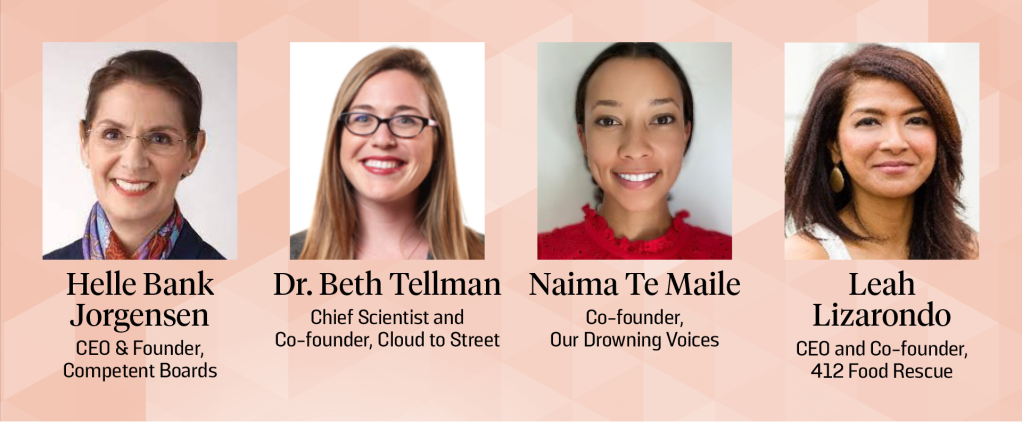
Panel 3: Solutions for Just and Resilient Global Futures
This panel, moderated by Amanda Ellis, senior director at the Julie Ann Wrigley Global Futures Laboratory, brought together women working on innovative solutions to the challenges and threats posed by climate change and asked them to identify concrete actions that conference attendees could take. Naime Te Maile, co-founder of Our Drowning Voices, spoke passionately about climate racism and justice, particularly highlighting the impact that rising sea levels are having on her home of Tuvalu and other Pacific Islands. She noted that, despite the fact that Pacific Islanders contribute almost nothing to global greenhouse gas (GHG) emissions, they are on the frontlines of climate impacts that are exacerbating existing inequalities both between and within nations. She called on world leaders to amplify the voices of indigenous people and young people, who are being acutely affected by these challenges. She encouraged all attendees to follow more people and organizations from marginalized groups and to support their work. Dr Beth Tellman, chief scientist and co-founder of Cloud to Street, which monitors flood risks, noted that women and children are also extremely vulnerable to climate change and extreme weather events—as flooding becomes more common, women are more likely than men to lose their lives or livelihoods, linking the fights against climate change and for gender equality. She advocated for increased investment in weather-resistant infrastructure, as every dollar invested today could save up to seven dollars in avoided damages in the future, and she encouraged attendees to lobby their political representatives to earmark more funding for this work.
Leah Lizarondo, CEO and co-founder of 412 Food Rescue, outlined how food waste contributes to GHG emissions and how her company fits into the food supply chain to reduce waste and encourage composting, in support of SDG 12, on hunger, and SDG 13, on climate action. Lizarondo asserted that everyone in society has a role to play in tackling climate change, from politicians, to the leaders of major companies, to individuals who can adjust their habits and consumption every day. She called on audience members to be leaders in tackling food waste in their own communities as a way to “prevent that sense of despair and mov[e] toward action, [toward] small steps we can take every day.” Finally, Helle Bank Jorgensen, CEO and founder of Competent Boards, focused on the need for company leadership and board members to gain the skills and knowledge necessary to take concerted action on corporate ESG goals, noting that currently only around 17 percent of board members responsible for ESG have the relevant competencies for the task. Businesses, as major producers of waste and pollution, have a key role to play in the fight against climate change, and she called on all corporate leaders in the audience to ensure that their ESG goals are being managed by skilled and competent individuals.
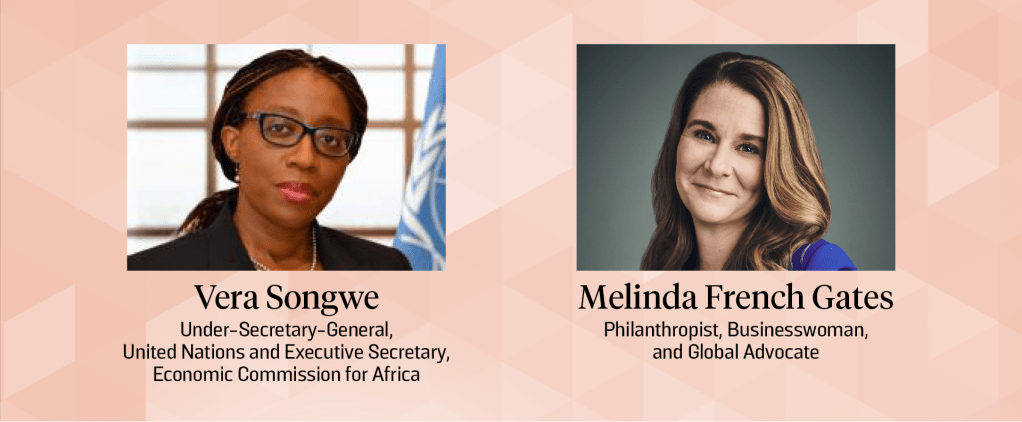
Unlocking the Economic Power of Women
The final session of the day brought together Melinda French Gates, philanthropist and co-chair of the Gates Foundation, and Vera Songwe, the under-secretary general of the United Nations for a discussion on women’s economic power and potential. French Gates consolidated many of the themes of the day, particularly regarding the COVID-19 pandemic’s role in exposing gender inequities and forcing societies and leaders to acknowledge and address those gaps, and laid out key issues on which global leadership should focus, including identifying and filling gaps in data collection, centering economic strategies around women as both workers and consumers, and ensuring that low-income countries are not left with crippling debt as a result of the pandemic. In particular, she called on the IMF to introduce debt-relief strategies that will enable low-income countries to focus on innovative, person-centered solutions to the impacts of the pandemic, and invest in their populations rather than channeling their money into loan repayment. Additionally, French Gates emphasized the need for post-pandemic recovery efforts to prioritize women and their needs—64 million women worldwide have lost or quit their jobs during the pandemic, and supporting their re-entry into the workplace will necessitate the provision of low-cost, high-quality child and elder care, as well as the opportunity to access training and re-skilling programs.
Under-Secretary Songwe additionally focused on the actions needed to empower women in the wake of the pandemic, calling for the development of strong digital infrastructure that would enable women to work flexibly and remotely, and for lowering the cost of remittance payments to ensure that more money is being spent on the things that matter rather than on transfer fees, an issue that she hopes the UN will prioritize in the near future. This issue is particularly relevant as the pandemic continues, as remittances are “used as a smoothing device during times of crisis,” replacing lost income and being spent on essentials such as food, education, and health care. Songwe also emphasized the importance of promoting girls’ education, the long-term benefits of which have been demonstrated by a great deal of research, although families must make sacrifices and investments in the present. Both speakers closed the day by highlighting things that give them hope, particularly the resilience that women around the world have shown in the face of the challenges of the pandemic, and the work of female political leaders throughout this period.
Day Two
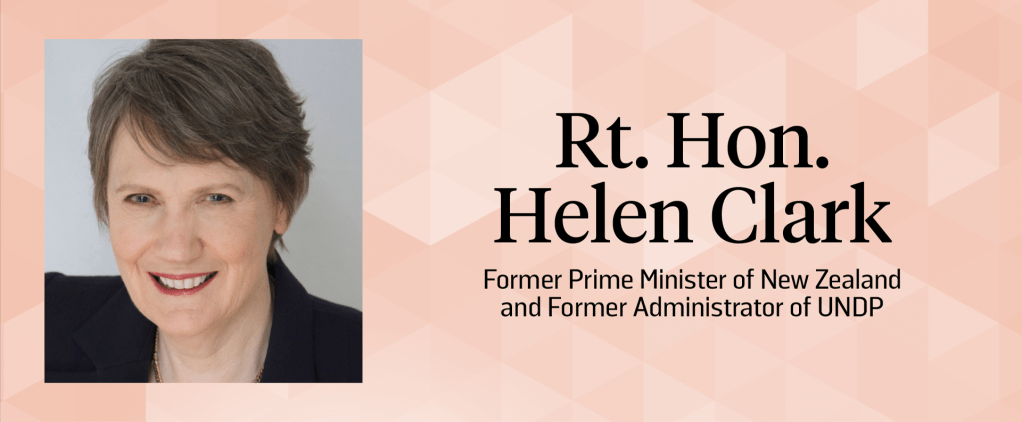
Opening Keynote by the Rt. Hon. Helen Clark
Opening day two of the summit, FP Executive Editor Amelia Lester moderated a conversation with former Prime Minister of New Zealand Helen Clark, in which Clark called for more women to enter politics and lead their countries, particularly in light of the success that female leaders have had in tackling the impacts of COVID-19, making rigorous and tough decisions. Clark also reflected on the situation in Afghanistan, which was invaded during her time as prime minister, noting that the Taliban’s relative ease in re-gaining control of the country can in large part be attributed to a development and re-building process that never truly reached rural areas, leading to resentment and a desire for new leadership. In particular, she criticized western leaders for being overly focused on military spending, neglecting to support Afghan leaders to define their own objectives for progress and development, which may have been more widely accepted by the population. She finished her keynote conversation by calling on all world leaders to put continuous pressure on the Taliban to uphold basic rights, particularly those of women and girls, whose rights to work and education are being threatened. She reminded the audience to keep thinking about and fighting for the “upwards of 36 million people there who can’t leave, who probably don’t want to leave their homeland, but have to live this experience,” saying, “we can’t walk away from them.”
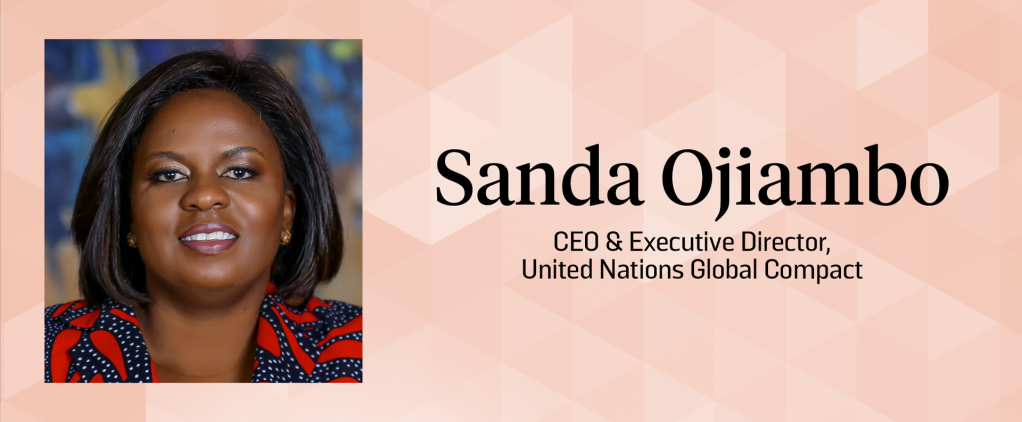
Q&A with Sanda Ojiambo
In a pre-recorded segment, Sanda Ojiambo, CEO and executive director of the UN Global Compact, joined journalist Maggie Lake to discuss how the Global Compact is working with the private sector to encourage gender equality and support the meaningful engagement of women and girls in the workplace. Ojiambo began by noting the importance of gender equality, and inclusion more broadly, by pointing out that “inclusive perspectives, inclusive discussions . . . bring about inclusive outcomes. And inclusive outcomes are great for business . . . they’re great for the community, and they’re great for the world.” For that reason, she encouraged businesses to value diversity as a strength, rather than see it as a threat, and to work proactively to increase women’s participation in the workplace and the marketplace. The sustainability and success of businesses, she argued, will depend partly on whether they are pursuing purpose, as well as profit, two goals that Ojiambo believes are not only compatible but vital to positive social outcomes.
Ojiambo expressed optimism regarding the progress that has been made over the years toward gender equality in the private sector. In particular, she noted that, a decade after the launch of the joint UN Women and UN Global Compact Women’s Empowerment Principles—which guide companies through a process of self-assessment regarding female workplace participation and identify and take concrete actions for improvement—the number of signatories to the Principles has grown from 39 original businesses to over 5,600. When asked, in closing, how best to harness the momentum to advance meaningful change in post-pandemic recovery, Ojiambo praised the businesses that have introduced policies supporting gender equality throughout their supply chains, procurement, and working hours, among other areas, and called on them to move from ambition action, to capitalize on the current moment.
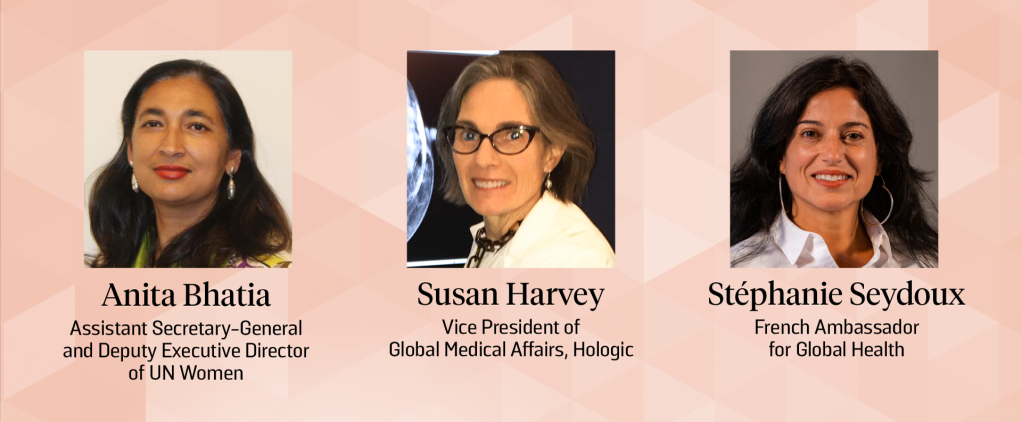
Panel 1: Putting Women’s Health at the Core of Sustainable Development
In the second panel of the day, participants discussed the need for greater health care spending and demonstrated how women’s health can sit at the center of sustainable development strategies around the world. Anita Bhatia, assistant secretary-general and deputy executive director of UN Women, opened by noting that health care spending has been deprioritized by governments around the world in favor of military spending—despite the impacts of the pandemic—and that spending on women’s health care has become even less of a priority. Health care is an investment in the future, yet as she noted, “many governments still do not see it as an investment that is building human capital, infrastructure, and is a fundamental pillar of growing the economic pie and creating a more prosperous country.” Bhatia argued that prioritizing health care spending will require finding new methods of development financing that will enable low-income countries in particular to freely invest in the health of their populations, instead of focusing on loan repayment, an issue for which she is advocating as a part of UN Women. As only 17 percent of the global female population live in high-income countries, identifying strategies for health care spending in low- and middle-income countries is particularly vital.
Susan Harvey, vice president of global medical affairs at Hologic, agreed with the need for greater investment in health care but noted that a lack of data on women’s and girls’ experiences with medical care can make it difficult to prioritize spending and investment. As a result of fielding surveys to over 60,000 women and girls in 116 countries, Hologic has identified five primary dimensions of women’s health that affect over 80 percent of life expectancies: preventive care, emotional health, workplace health and safety, basic needs, and individual health. Governments, particularly those with limited budgets, should prioritize these areas and identify low-cost, widely deployable interventions—such as STD tests, which can also act as screenings for cervical cancer—to make the most impactful investments. Finally, Stephanie Seydoux, France’s ambassador for global health, discussed the challenges facing women working in the health care industry; despite the pandemic demonstrating how important these workers are, wages remain low and working conditions poor. She noted that in France around 70 percent of all health care workers are female, meaning that investment in the health care industry can itself be an investment in women’s rights and quality of life. In particular, Seydoux highlighted a new initiative launched by the French government at the July 2021 Generation Equality Forum–the Gender Equal Health and Care Workforce Initiative—that will guarantee living wages for health care workers and ensure that women are present in all conversations regarding health care spending and policy, thus acknowledging the intersection between women’s rights and health.
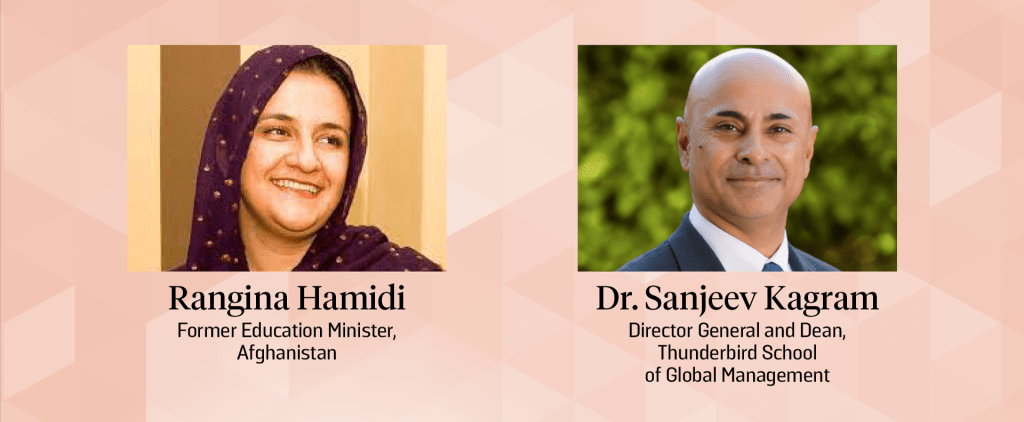
Advancing Gender Equality Through Girls’ Education
Dr. Sanjeev Kagram, director general and dean of the Thunderbird School of Global Management, moderated a conversation about the situation in Afghanistan with former Afghan Education Minister Rangina Hamidi, who began by describing her experiences of being a refugee twice in her life—first as a child and again as an adult—and of being a Muslim in the United States during and after the 9/11 attacks. As Afghanistan’s education minister, Hamidi prioritized the development of high-quality girls’ education and the creation of a new national curriculum, as the curriculum in use at the start of her tenure in 2020 had not been changed or adapted since the American invasion two decades earlier. She described her plan for the new curriculum as “to educate children to become future leaders of a country that they would call their own and not run away from.” Hamidi ended the conversation by describing her feelings of betrayal and sadness at the outcome of the peace talks and withdrawal of U.S. forces in August, which she sees as undermining the work she has done in recent years to build a progressive Afghan society, but she vowed to continue fighting for Afghan girls’ right to an education.
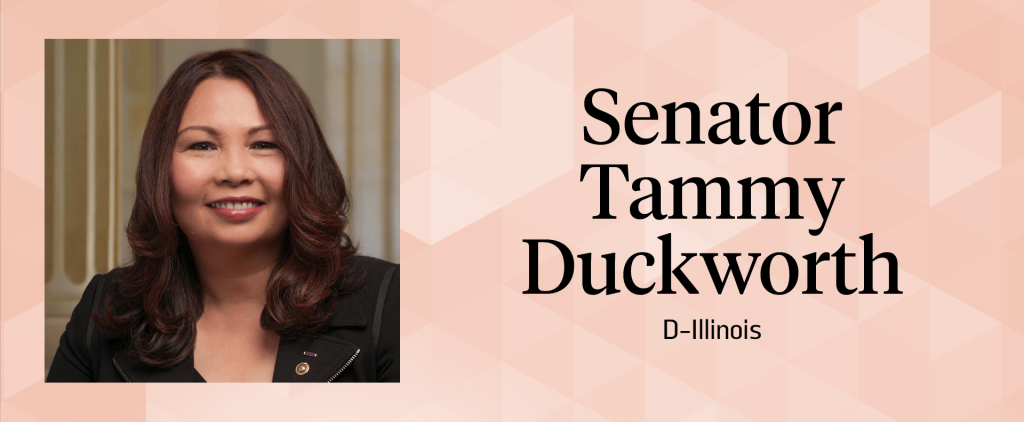
Fireside Chat: A View from Congress, with Senator Tammy Duckworth
Afghanistan remained a major topic in Amelia Lester’s fireside chat with Senator Tammy Duckworth, who has introduced legislation in the U.S. Senate calling for a review of the past two decades of U.S. involvement in Afghanistan in an effort to better understand how the situation could have deteriorated so rapidly following the U.S. withdrawal. Senator Duckworth described her experience visiting Afghanistan in 2014 on a congressional trip, where she was able to speak with a room of women, using female translators, and hear their concerns. Duckworth expressed regret that many of the women were facing challenges that could have been fixed easily—for example, several women present had trained as police officers but were unable to be assigned to official roles as the precincts did not have female toilet facilities—but were not, due to a lack of prioritization of women’s issues by the U.S. Duckworth also described her experiences of being the first or only woman in a number of contexts, including in the military and in the Senate, where she was also the first person to bring their newborn baby onto the Senate floor. She noted that it was often easier to be a woman in the military than in civilian workplaces due to a strict meritocracy and the benefits of equal pay for equal work and salary transparency, all of which she would like to see in more civilian contexts as well.
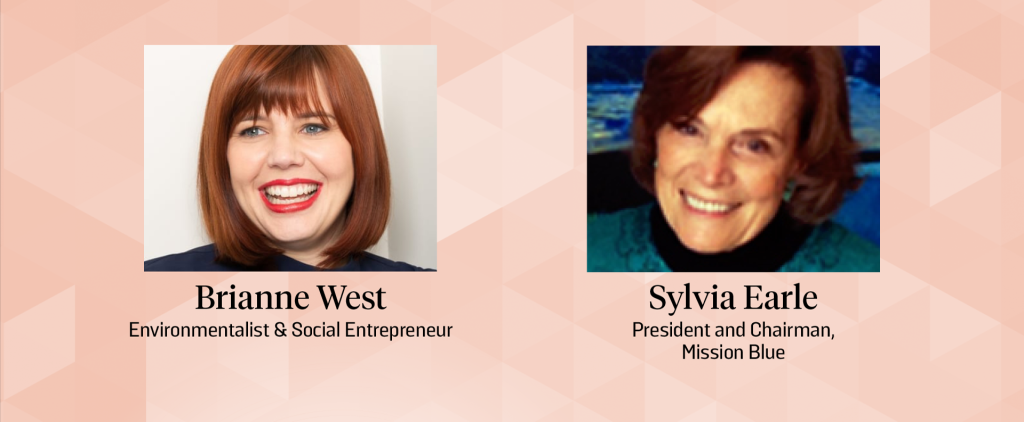
Panel 2: From Sustainability to Renewal: Regenerative Solutions to the Climate Crisis
Reena Ninan returned to moderate a discussion between Brianne West and Sylvia Earle regarding the approaches that different actors can take to address the climate crisis. As a business owner and social entrepreneur herself, West emphasized the key role that companies and their leadership can and should play in creating widespread, positive change around the climate, as businesses have a great deal of influence over both the supply chain and consumers and can encourage alternative behaviors and business practices. She noted that her own brand, Ethique—which sells low-waste skin care and hair care products—has been successful due to an increased interest from consumers in patronizing companies with a social mission. To date, Ethique’s packaging has saved 13 million plastic bottles from being manufactured and disposed of, and West aims to save half a billion bottles by 2030. Conversely, West also noted the power that consumers have over the decisions that companies make, stating that for individuals, “the best way to encourage businesses to change is to show them that it’s possible . . . to demand more of your favorite brands.”
Earle, who promotes ocean conservation through her organization Mission Blue, expressed a desire to see greater progress at a faster rate, from businesses, governments, and individuals, noting that everyone has a part to play in the long-term solutions to climate change. She was optimistic about the leadership role that women appear to be playing in addressing the climate crisis, in both politics and the private sector, but emphasized the urgency of the task at hand—there is a need to restore at least 30 percent of the quality of degraded land and oceans in the next ten years in order to maintain ecological health, and for humanity to continue to prosper and to maintain quality of life.
Looking Ahead
The COVID-19 pandemic has illuminated and exacerbated the structural inequalities that affect women around the world. As participants in the Her Power summit emphasized, leaders—in both governments and the private sector—can no longer ignore the existence of these disparities and their impacts. Alongside existing policies, the development of pandemic-recovery strategies provides an opportunity to craft and implement policies that not only improve women’s quality of life but also strengthen economic, health, and political outcomes nationally and globally.
In particular, private- and public-sector intervention in the caregiving sector will be vital to the improvement of women’s lives, and to enabling continued education and return to the workforce. Participants from the private sector, national governments, and international institutions demonstrated that all stakeholders in gender equality can play a role in improving standards of caregiving through the recognition of information caregiving; provision of affordable, high-quality childcare; sustainable pay for health care professionals and teachers, and more. While there is much to be done, the Her Power Summit highlighted a number of concrete recommendations and calls to action that, if harnessed, can inform needed policy changes in the days ahead.
This synthesis report was produced by FP Analytics, with support from the Bill & Melinda Gates Foundation. The content of this report does not represent the views of the editors of Foreign Policy magazine, ForeignPolicy.com, or any other FP publication.
